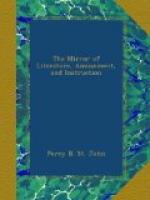IV.
The humid clouds of spring float over
the enamelled meads,
And, like my eyes, dissolve in tears.
My fancy seeks thee in all places; and
the beauties
Of Nature retrace, at every moment,
Thy enchanting image. But thou, O
cruel fair one!
Thou endeavourest to efface from thy memory
The recollection of my ardent love—my
tender constancy.
Thy charms eclipse the growing
tulip—
Thy graceful stature puts to shame the
lofty cyprus.
Let every nymph, although equal in beauty
to Shireen,[10]
Pay homage to thy superiority; and let
all men
Become like Ferhad[11] of the mountain,
Distracted on beholding thy loveliness.
How could the star of day
have shone amidst the heavens,
If the moon of thy countenance had not
concealed
Its splendour beneath the cloud of a veil?
Oh! banish me not from thy sight;
Command me—it will be charitable—
Command me to die.
How long wilt thou reject the amorous
solicitations
Of thy Khacan? Wilt thou drive him
to madness
By thy unrelenting cruelty? The doomed
To endless tears and lamentations.
[5] A person, called the Mawezn,
summons the people to prayers
from
the tower, at certain stated times, by ringing bells.
[6] Toos, the son of Nouder,
makes a conspicuous figure among
the
princes and warriors, celebrated by Ferdoosi in his
book of
Kings.
[7] Caus supposed to have
been Darius the Mede by some
historians.
[8] This poetical surname
Khacan, adopted by Fath Ali Shah,
signifies
emperor or king.
[9] The prophet Khezr (whom
some mistake for Elias) is said to
have
discovered and tasted the “waters of immortality,”
and
consequently
to be exempt from death.
[10] Shireen, the favourite
of Khosroo, is no less celebrated
for
her beauty than for the passion with which she inspired
Ferhad.
[11] Of this unfortunate lover
Ferhad, the romantic story has
been
told by several distinguished writers. The mountain
to
which
our royal poet alludes is the Kooh Bisetoon (in the
province
of Curdistan), where are still visible many figures
sculptured
in the rock, which, by the romances of Persia, are
ascribed
to the statuary Ferhad. Among these sculptures,
travellers
have noticed the representation of a
female—according
to local tradition, the fair Shireen, mistress
to
King Khosroo, and the fascinating object of Ferhad’s
love. As
a
recompense for clearing a passage over the mountain
of
Bisetoon,
by removing immense rocks, which obstructed the path
(a
task of such labour as far exceeded the power of common
mortals,
by Ferhad, however, executed with ease), the monarch




